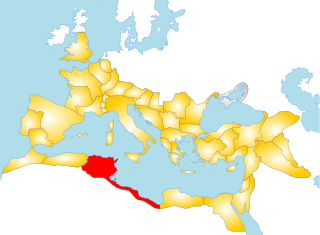
Ifriqiya, also known as al-Maghrib al-Adna or Oriental Berberia, was a medieval historical region comprising today's Tunisia, eastern Algeria, and Tripolitania. It included all of what had previously been the Byzantine province of Africa Proconsularis and extended beyond it, but did not include the Mauretanias.
This is an alphabetical list of topics related to Islam, the history of Islam, Islamic culture, and the present-day Muslim world, intended to provide inspiration for the creation of new articles and categories. This list is not complete; please add to it as needed. This list may contain multiple transliterations of the same word: please do not delete the multiple alternative spellings—instead, please make redirects to the appropriate pre-existing Wikipedia article if one is present.

Ayn-al-Qużāt Hamadānī, also spelled Ain-al Quzat Hamedani or ʿAyn-al Qudat Hamadhani (1098–1131), was a Persian jurisconsult, mystic, philosopher, poet and mathematician who was executed at the age of 33.
Abu Abdallah al-Husayn ibn Ahmad ibn Muhammad ibn Zakariyya, better known as Abu Abdallah al-Shi'i, was an Isma'ili missionary (dāʿī) active in Yemen and North Africa. He was successful in converting and unifying a large part of the Kutama Berber tribe, leading them on the conquest of Ifriqiya from 902 to 909 and the overthrowing of the Aghlabid dynasty. This ultimately led to the establishment of the Fatimid Caliphate in Ifriqiya under the Imam–caliph Abdullah al-Mahdi Billah. However, Abdullah al-Mahdi Billah quickly fell out with Abu Abdallah and had Abu Abdallah executed on 18 February 911.
Ibn al‐Bannāʾ al‐Marrākushī, full name: Abu'l-Abbas Ahmad ibn Muhammad ibn Uthman al-Azdi al-Marrakushi, was an Arab Muslim polymath who was active as a mathematician, astronomer, Islamic scholar, Sufi and astrologer.
In Arabic names, a nisba, also rendered as nesba or nesbat, is an adjective surname indicating the person's place of origin, ancestral tribe, or ancestry, used at the end of the name and occasionally ending in the suffix -iyy for males and -iyyah for females. Nisba, originally an Arabic word, has been passed to many other languages such as Turkish, Persian, Bengali and Urdu.
Yakub, Yaqub, Yaqoob, Yaqoub, Yacoub, Yakoub or Yaâkub is a male given name. It is the Arabic version of Jacob and James. The Arabic form Ya'qūb/Ya'kūb may be direct from the Hebrew or indirectly through Syriac. The name was in use in pre-Islamic Arabia and is a common given name in Arab, Turkish, and Muslim societies. It is also used as a surname. It is common in Polish, Czech and Slovak languages, where it is transliterated as Jakub.
The Naqshbandi-Haqqani Golden Chain is the chain of succession of Sufi masters in the Naqshbandi-Haqqani Sufi Order.
Muhammad ibn Ishaq ibn Ibrahim was a Mus'abid chief of security of Baghdad for the Abbasid Caliphate, from 850 until his death.
Abu Abdallah Muhammad ibn Ibrahim ibn Mus'ab was a Mus'abid military commander and provincial official for the Abbasid Caliphate. He served as the governor of Fars from 846–7 until his death.

Abu'l-Qasim ibn Hammud ibn al-Hajar was a senior official or Qaid of the Norman Kingdom of Sicily, and a leader of the Muslim community of Sicily.
bin Ibrahim or ben Ibrahim is an Arabic patronymic meaning "son of Ibrahim". Similarly, bint Ibrahim means "daughter of Ibrahim". Notable people with this patronymic include:
This page is based on this
Wikipedia article Text is available under the
CC BY-SA 4.0 license; additional terms may apply.
Images, videos and audio are available under their respective licenses.



